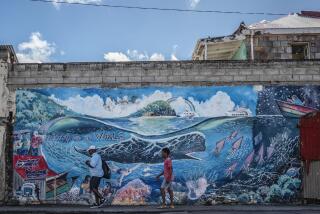Elephant’s Underwater Cousin to Be Protected : Ivory Coast Plans Reserve for Manatee
- Share via
ABIDJAN, Ivory Coast — Plans are under way to create the first reserve in Africa for the manatee, the 1-ton, 10-foot-long underwater cousin of the elephant.
The manatees live in lagoons, rivers and coastal areas from Senegal to Angola.
The reserve, on an inlet of the Bandama River near Abidjan, could be established as soon as March, according to Gbande Die, director of the adjacent Azagny National Park.
“This will be the first protected zone for manatees in Africa,” Die said in an interview.
No one knows precisely how many manatees, also known as sea cows, there are in Abidjan, whose oceanfront lagoons make ideal habitats, but officials say the population is dwindling and estimate their numbers in the hundreds rather than thousands.
“When we ask the peasants, they tell us they used to see lots of manatees and now they don’t,” Die said.
The reserve will allow scientists to study manatees, which are found in Florida, the West Indies, the Amazon basin and West Africa, and whose behavior is little known.
The experts will also determine how best to protect the animals, which are hunted for their beef-like flesh.
Manatees are mammals and had a common ancestor with the elephant 75 million years ago. They have been a protected species since this former French colony became independent in 1960, but that has not stopped fishermen from poaching them.
“It’s hard to enforce because the law is just a piece of paper,” Die said. “And it’s not just manatees, it’s virtually all wild animals in Ivory Coast that suffer.”
Much of the impetus for creating the reserve and protecting manatees arises from work here by James Powell, 34, an American naturalist from Wildlife Conservation International, an arm of the New York Zoological Society.
“We should be as concerned about the manatees as we are about the rhinoceros,” Powell said recently. “Manatees are big, impressive and unique. There is nothing else like them.”
He said that manatees, whose night-time squeals are believed to have sparked mermaid myths and who are associated in West Africa with a spirit called “Mamie Wata,” are timid and gentle.
The West African manatee, which has a wide muzzle and a long, bulbous trunk with two side flippers, looks a bit like a toothless walrus or a sea lion.
“They are extremely strong but they don’t seem to have an aggressive bone in their bodies,” said Powell, who has trapped 18 manatees to fit them with radio transmitters so he can track their movements. He was able to work with them without tranquilizing them.
He said that visitors have flocked to see a baby manatee he raised in a pen near a popular beach resort, but the animal died several months ago.
He doubted that the dark-gray manatees, which are almost impossible to see in the murky lagoons, could become a tourist attraction, as they have in Florida. But Powell thinks man and manatee could learn to live side by side.
“They have an important role in the estuarine environment,” he said. “They are the only large herbivores, so they eat off the unwanted vegetation.”
He also said that if hunting were regulated manatees could provide an important source of protein.
Powell and officials of Ivory Coast’s Ministry of Water and Forests said the key to saving the manatee is learning more about them and educating fishermen about the perils of poaching.
Kouadio Akoi, an Education Ministry officer who works with Powell, said that it is hard to persuade people to give up a source of food but that it can be done.
“The fishermen tell us, ‘First you say don’t kill the tortoise, then you say don’t kill the manatee--what are we going to eat?’ “But the disappearance of an animal would be a loss to everybody. We have a heritage we have to leave to our children.”
More to Read
Sign up for Essential California
The most important California stories and recommendations in your inbox every morning.
You may occasionally receive promotional content from the Los Angeles Times.













